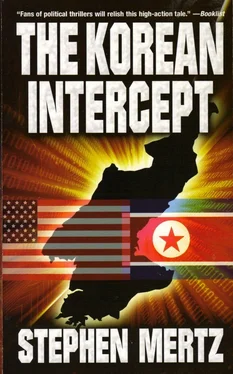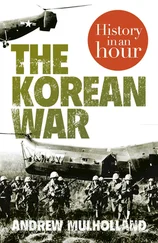Stephen Mertz - The Korean Intercept
Здесь есть возможность читать онлайн «Stephen Mertz - The Korean Intercept» весь текст электронной книги совершенно бесплатно (целиком полную версию без сокращений). В некоторых случаях можно слушать аудио, скачать через торрент в формате fb2 и присутствует краткое содержание. Жанр: Триллер, на английском языке. Описание произведения, (предисловие) а так же отзывы посетителей доступны на портале библиотеки ЛибКат.
- Название:The Korean Intercept
- Автор:
- Жанр:
- Год:неизвестен
- ISBN:нет данных
- Рейтинг книги:3 / 5. Голосов: 1
-
Избранное:Добавить в избранное
- Отзывы:
-
Ваша оценка:
- 60
- 1
- 2
- 3
- 4
- 5
The Korean Intercept: краткое содержание, описание и аннотация
Предлагаем к чтению аннотацию, описание, краткое содержание или предисловие (зависит от того, что написал сам автор книги «The Korean Intercept»). Если вы не нашли необходимую информацию о книге — напишите в комментариях, мы постараемся отыскать её.
The Korean Intercept — читать онлайн бесплатно полную книгу (весь текст) целиком
Ниже представлен текст книги, разбитый по страницам. Система сохранения места последней прочитанной страницы, позволяет с удобством читать онлайн бесплатно книгу «The Korean Intercept», без необходимости каждый раз заново искать на чём Вы остановились. Поставьте закладку, и сможете в любой момент перейти на страницу, на которой закончили чтение.
Интервал:
Закладка:
Watching Trev and the man leave the press room, a new thought muted her emotions. Could there be a connection between the space shuttle and the preoccupation, the disengagement, which she had sensed on the part of Press Secretary Halliday? The Liberty's mission and schedule were classified, but the launch had been reported as a success.
Had something gone wrong?
Chapter Five
North Korea
Dawn silhouetted the mountains. Sunrise rouged the snowy slopes of Mount Paekdu. The intermittent flurries of last night had not stuck to the frozen ground at the lower elevation where the airfield dominated a narrow, shallow valley.
The perimeter of the military landing field was a galvanized welded-mesh fence topped with barbed wire that glinted in the frozen sunshine. At each corner of the oblong perimeter of the base was a watch-tower. Set apart from the barracks, which were dreary, squat structures of cinderblock, was a modern control tower rising from a single-story building with an oversized, rotating dish-shaped radio and television antenna on the roof. The building and tower dominated an inner compound surrounded by its own barbed wire perimeter, complete with patrolling sentries armed with assault rifles.
Sergeant Bol Rhee stood with his men on the tarmac beside a Soviet-made M-6 helicopter, watching the ground crew work frantically on the engine. It was twenty minutes since the last of the other gunships had lifted off, but since the flight crews were under orders to utilize the onboard heaters only during the months of December through February, on this brisk November morning Bol was glad for the delay. It gave him and his platoon precious additional time to store up what warmth they could from the sunshine before boarding the helicopter for what would surely be a cold, cold flight into the surrounding hills. Search flights spreading out in concentric circles from the base had begun hours earlier and would be continued around the clock.
Bol Rhee had the stocky, rawboned build of the peasant class from which he came. He sometimes wished that he was still a youngster, that he had never grown up to become a career soldier in the People's Army. But wishing did not make it so, and he was far better off than many. The country above the 38th parallel was wracked with poverty. At least in the army he ate well and had a roof over his head.
He thought again that this was the strangest duty assignment of his army career. His company had been sent to provide security for this hastily constructed airfield. The completed runway was much wider and longer than any Bol had ever seen. But except for the patrol gunship helicopters already stationed here, no aircraft had ever landed or taken off from this runway. Supplies and materials were delivered by truck at night. Military engineers had constructed the base in record time. There were two distinctly separate, vigorously segregated groups: those who worked in and around the tower and those who provided security.
Since the completion of the base, the technicians in their white smocks had stepped up their work around the clock. There continued to be virtually no air traffic in or out, with one exception. Sometimes in the middle of the night, a helicopter would touch down for a brief visit. Civilians were aboard and spent their time in the tower. During one such visit, Bol had seen the helicopter's markings. Not military, but Japanese civilian!
The only thing stranger was what had happened earlier this morning. The entire company had been positioned along the perimeter. The airfield landing lights were turned on for the first time since the base had become operational, and Bol had witnessed something he would never forget. Something amazing.
A space shuttle with American markings had soared in for a landing, had appeared fully ready to land, before unexpectedly overshooting the runway at the last possible instant and disappearing majestically into the darkness!
Then, within minutes he'd been standing in formation with his men, listening to Colonel Sung order the sweep of the surrounding countryside in search of an American space shuttle, which the base commander told them had malfunctioned while in orbit and had attempted an emergency landing but was feared to have crashed. This was a cooperative venture authorized by the United States, their commanding officer had informed Bol and the other troops. No man present was to utter a word of this to anyone, under penalty of death.
Bol believed the part about the death penalty, but not much else. Truly, a very strange duty assignment.
Colonel Sung now appeared, striding through the morning sunlight toward the helicopter from the direction of the tower, just as the maintenance crew chief signaled to the pilot. The gunship's engine coughed, sputtered, coughed again and started, filling the air with harsh black diesel exhaust. Bol ordered his men aboard, then turned to greet the base commander.
Sung's uniform was heavily starched. His boots were spit-polished, but he was soft around the middle from too much beer. "Valuable time is being lost, Sergeant. I had wanted your platoon in place by first light." Sung raised his voice to be heard above the engine noise.
"My apologies, Colonel," said Bol. "The helicopter-"
"Yes, well, it's been repaired, hasn't it? Remember, I want a thorough sweep of your sector, Sergeant. If Japanese troops are sighted, do not engage them. Radio your position without delay."
"One question, Comrade Colonel. Chinese border patrols have also been known to cross into this region from time to time."
"Expect anything. And stop wasting time."
"Yes, Comrade Colonel."
Bol boarded the helicopter.
The gunship lifted off, banking to the east. As he sat on the hard bench, shivering with his men, Bol wrapped his arms across his chest and hugged himself to stay warm. He looked out a side window to watch Sung and the airfield tilt away and recede into the distance below. It was even colder in the helicopter than he'd thought it would be.
He wondered what this day would bring.
Ahn Chong led them to a rocky, craggy outcrop of boulders where foliage overgrew a narrow gash, a fault in the stony surface at a low jut of rock that was well camouflaged by dense thickets.
The interior of the cave was vaguely illuminated by refracted light of the new day, slanting in through the foliage that concealed the entrance. There was a musty, unpleasant closeness about the place, a rodent smell, and some old animal droppings scattered about. But at least it wasn't cold. It was almost warm in comparison to the world outside, here in this close, crowded, dim, musty, confined space no more than ten feet high and thirty feet deep.
They were less than a kilometer from the Liberty, by Kate's estimation, though it had been difficult to be certain as the old man led them along the rugged, circuitous route to get here. It had been extremely slow going with Ron hobbling along, staying off his broken leg as best he could, leaning heavily on Ann Chong. Kate and Bob transported Terri.
Several times along the way, they had done what Scott had first commanded them to do while still at the shuttle, when a North Korean gunship equipped with searchlights had swept by as low as the hazardous terrain would allow, without spotting the camouflaged shuttle. Then, and several times en route, their small group had been forced to huddle beneath the cover of tall pine trees while military helicopters rumbled by overhead at a slow rate of speed like bloated, low-flying prehistoric birds searching for prey.
"Ahn said we're about three kilometers from the airfield," Scott said after the most recent flyover, listening carefully with an ear cocked. "That chopper's getting set to touch down."
"We expected that, didn't we?" Kate spoke matter-of-factly. "If they find us, they'll know the shuttle is nearby."
Читать дальшеИнтервал:
Закладка:
Похожие книги на «The Korean Intercept»
Представляем Вашему вниманию похожие книги на «The Korean Intercept» списком для выбора. Мы отобрали схожую по названию и смыслу литературу в надежде предоставить читателям больше вариантов отыскать новые, интересные, ещё непрочитанные произведения.
Обсуждение, отзывы о книге «The Korean Intercept» и просто собственные мнения читателей. Оставьте ваши комментарии, напишите, что Вы думаете о произведении, его смысле или главных героях. Укажите что конкретно понравилось, а что нет, и почему Вы так считаете.











